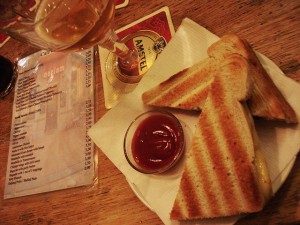incompetent blunderer, screw up <person> ![]()
[noun]
[de prut-ser, de prut-sers]
A "prutser" is a person who screws or messes things up. The related verb is "prutsen", which translates to "to blunder". You may also say the verb "verprutsen", which translates to "to mess up". The difference with "prutsen" is that "prutsen" indicates that you’re still in the middle of messing things up, while
"verprutsen" is more focussed on reaching a messed up state in the end.
Examples:
– "Frank is een totale prutser."
("Frank is a total screw up.")
– "Afgelopen dinsdag is Gmail getroffen door een wereldwijde storing." – "De prutsers…"
("Gmail was hit by a worldwide breakdown last Tuesday." – "Screw ups…")
Expressions:
– "Twee linkerhanden hebben": to have two left feet. Lit.: to have two left hands
Related words:
– Prutsen: to blunder, to be messing things up [verb] [prutste, geprutst].
– Verprutsen: to mess up [verb] [verprutste, verprutst].
Example:
– "Ik heb mijn tentamen helemaal verprutst."
("I’ve totally screwed up my exam.")
– Lutser: combination of a loser and a "prutser":-) [noun] [de lutser, de lutsers].
– Kluns: clumsy person [noun] [de kluns, de klunzen].
– Klojo: f*ck/screw up (person) [noun] [de klojo, de klojo’s].




 There’s not really an equivalent in English for “tosti”. In French, there is, though: “croque-monsieur”. “Tosti” apparently originates from the Italian “tosto” (from which “tosti” is the plural form), which is short for “tostato”, which is the past particple of “tostare”: to toast.
There’s not really an equivalent in English for “tosti”. In French, there is, though: “croque-monsieur”. “Tosti” apparently originates from the Italian “tosto” (from which “tosti” is the plural form), which is short for “tostato”, which is the past particple of “tostare”: to toast.